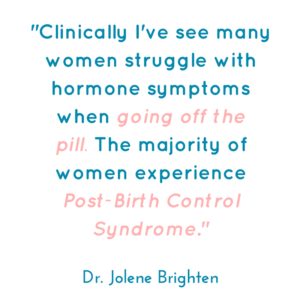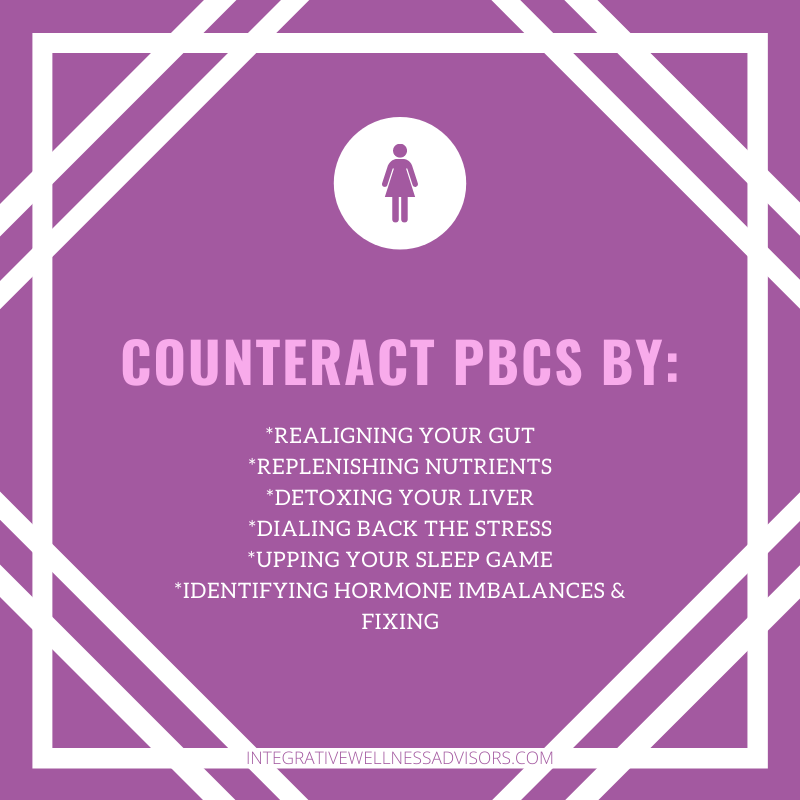Why Hormonal Birth Control May Not Be the Best Choice
Mar 10, 2021
Maybe you used to think that using the Pill was no big deal. But did you know that using hormonal birth control to treat symptoms (such as acne or heavy periods) is only covering up an underlying issue and potentially allowing the symptoms to get worse or the underlying issue to progress? Maybe you used the Pill for its intended use – to prevent pregnancy. But did you know that while it can be extremely effective, there are some major negative consequences of long-term use? Some of the side effects are heart attack, stroke, blood clots, skin & breast changes, hair loss, effect on your libido, and so much more. And that doesn’t begin to cover the increased risks of depression, plus the hormonal mess this kind of birth control can create.
So if you are considering ditching the pill or another form of hormonal birth control, it’s important that you understand what happens when you stop using it. Please read on so you have the info you need…
WHAT HAPPENS WHEN YOU GO OFF BIRTH CONTROL
You may think going off of hormonal birth control will lead you to regular cycles and no side effects, (and a few lucky people DO start regular cycles again and have minimal symptoms), but that likely won’t be the case. Because most women using hormonal birth control (like The Pill) are doing so to regulate hormonal imbalances, that means that when they stop using it, their hormonal imbalance symptoms return. This equates to menstrual irregularities, acne, hair loss, mood swings, depression, anxiety, and vaginal infections. Symptoms usually show up within 4-6 months after discontinuing use.
This is called post-birth control syndrome (PBCS).

WHAT ARE THE SYMPTOMS OF PBCS
Post-birth control syndrome has been around since the introduction of hormonal birth control. The underlying causes can include nutritional deficiencies, impaired liver, stress, and more. If you’re suffering from PBCS you may have some of the following symptoms:
- Infertility
- Menstrual irregularities such as loss of menstruation, painful periods, short cycles, or heavy menstruation
- Acne
- Breast tenderness
- Headaches/migraines
- Adrenal dysfunction
- Weight gain or difficulty losing weight
- Hypothyroidism
- Anxiety or depression
- Hair loss
- Blood sugar dysregulation
- Leaky gut
- Gas or bloating
- Inflammation and other immune imbalances
Not a lot of fun, right? Luckily, with a few diet & lifestyle changes you can beat post-birth control syndrome and all without using anymore drugs that might affect your body negatively.
What do you need to do?
HOW YOU CAN REBALANCE YOUR HORMONES

Realign your gut. Using hormonal birth control can disrupt gut flora and create an environment that breeds harmful bacteria which can lead to leaky gut. You can help restore your gut by incorporating fermented foods like sauerkraut and fiber-rich foods such as flaxseeds into your diet. You could also reduce the amount of grains, legumes and processed foods you consume, as they can be hard to digest. Start taking gut healing supplements such as probiotics and fish oil.
Replenish your nutrients. Birth control has been shown to deplete important nutrients your body needs, including folate (vital for fetal development if you want to get pregnant), B12, B2, B6, Vitamins C & E, and more. Restoring nutrients to your body should be at the top of your to-do list! Make changes to your diet by incorporating plenty of fruits & veggies, plus quality fats and grass-fed meats. Also, up your supplement game by taking a good prenatal vitamin that has plenty of zinc, magnesium, Vitamins A & D, and the rest of the nutrients mentioned.
Love your liver. Your liver removes excess hormones, but birth control can cause a hormonal buildup, making it harder for your liver to detox what it needs – especially because the process relies partially on B vitamins which birth control can deplete. This means your liver needs some major TLC after going off birth control! It’s not a bad idea to do a detox to clean out your liver, for starters, as well as adding liver-supporting foods to your diet such as beets, dandelion root tea, and garlic.
Dial back the stress. Chronic stress causes adrenal fatigue which messes with the hypothalamus & pituitary glands that help regulate the menstrual cycle causing irregular cycles and sometimes leading to amenorrhea (no longer having periods). If you’re trying to overcome post-birth control syndrome your cycle may already be out of whack so managing stress is essential. Try meditation, journaling, yoga, going for a run, or whatever helps you relax, on the reg to maintain lower stress levels!
Up your sleep game. You know sleep is important, but sometimes it just seems that there’s too much to do and you don’t get enough. Plus, chances are you aren’t getting as good of a sleep as you might think due to late night TV, tablet reading, or cell phone/device use. All of these affect your body’s natural sleep process in negative ways. You’ve likely heard of circadian rhythms – the natural, internal process that regulates the sleep-wake cycle and repeats roughly every 24 hours. This affects all endocrine hormones, some of which are vital to maintaining a regular menstrual cycle. When you get less than enough or ineffective sleep, these hormones aren’t released at the right times. One of the biggest ways to combat this is by reducing your light exposure at night. Try using blackout curtains or even a sleep mask to have as little light as possible near you while trying to sleep. And turn off the TV and electronics at least an hour before bed – their artificial light tricks the brain into staying awake! Plus, you can up your ‘sleep health’ by going to bed and waking up at the same time every day. You’ll soon find you sleep better than ever.
Identify your hormone imbalances & fix the issue. The Pill works by shutting down the conversation between your ovaries and your brain, so when you stop taking it they sometimes have issues starting the conversation back up again. And the synthetic hormones in the Pill impact estrogen, progesterone, testosterone, insulin, cortisol, and the thyroid. It’s no surprise that all of this disruption results in mood swings, painful periods, and more! The first thing you should do if you’re suffering symptoms of PBCS is to get your labs checked – this includes comprehensive thyroid testing, adrenal testing, and checking sex hormones. Once that’s done and you’ve discovered the root cause of your symptoms you can work with an integrative wellness practitioner to develop a plan that balances your hormones and gets your ovaries & brain speaking once again.
WHAT TO DO NEXT
If you’ve decided to go off hormonal birth control, I want to support you on taking the first step to a healthier better you! If you find yourself suffering from any of the symptoms of post-birth control syndrome, I’d love to help you with that. Let’s chat so I can help you identify what’s going on with your hormones and get you back to feeling happy, healthy, and normal in no time! Before you know it you’ll feel like your best self yet.

